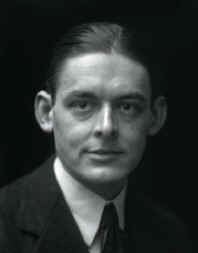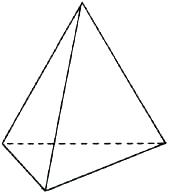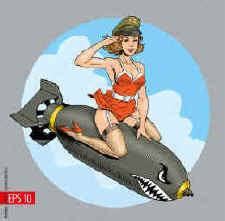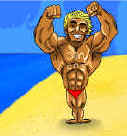 Baseball
Baseballin Hell
 Baseball
Baseball
in Hell
|
It happens to everybody - Nobody gets out of life alive. You know something Fantan? This world is so full of crap, a man's gonna get into it sooner or later whether he's careful or not. Hud |
D Vautier
12/2022
 T.
S. Eliot was a weird guy. He wasn’t weird in the ordinary way, just
another paper pusher struggling through life in England during World War Two
whilst London continued to burn and be bombed. But his mind was ablaze
with crazy ideas, concepts, wild relations and incredible connections. He
could use the language in such a way that it came alive and moved and wiggled
all over the place to the consternation of millions of college lit students.
T.
S. Eliot was a weird guy. He wasn’t weird in the ordinary way, just
another paper pusher struggling through life in England during World War Two
whilst London continued to burn and be bombed. But his mind was ablaze
with crazy ideas, concepts, wild relations and incredible connections. He
could use the language in such a way that it came alive and moved and wiggled
all over the place to the consternation of millions of college lit students.
You see, this guy was a poet whose goal was to communicate things that everyday people usually just don’t really understand or recognize or care too much about, so Eliot wrote a bunch of poems that pretty much rocked the world of literature, and also sent heads a'spinnin. In fact, our college lit professor once remarked that this man was essentially a “literary dictator” because he changed all the rules of the game. Poetry is trying to communicate complex ideas, emotions and feelings in ways that people can better understand, using all kinds of metaphor, allegory, tricks, figures and symbolism along the way.
 When
I was doing graduate work on my MBA at Portland State University in the early
70’s, I took an elective called “the Communication of Complex Ideas.”
It was a business course. Each student selected a subject and consulted
with the professor about the subject, and that over the course of the class,
communication techniques could be gradually explored, developed, shared and
improved. The usual assortment of subjects included such standard business
issues like marginal earnings, small business management, stock diversification,
market penetration, etc. At the end of the class we were to be reviewed by
a panel of three staff members or professors. When I met with my
instructor I said I was interested in the Quartets. He was quite taken aback.
He said, “That’s poetry! That is really challenging stuff! Are you
sure you want to do something so unusual?” I said yes and he said OK,
and so it was.
When
I was doing graduate work on my MBA at Portland State University in the early
70’s, I took an elective called “the Communication of Complex Ideas.”
It was a business course. Each student selected a subject and consulted
with the professor about the subject, and that over the course of the class,
communication techniques could be gradually explored, developed, shared and
improved. The usual assortment of subjects included such standard business
issues like marginal earnings, small business management, stock diversification,
market penetration, etc. At the end of the class we were to be reviewed by
a panel of three staff members or professors. When I met with my
instructor I said I was interested in the Quartets. He was quite taken aback.
He said, “That’s poetry! That is really challenging stuff! Are you
sure you want to do something so unusual?” I said yes and he said OK,
and so it was.
Thus began my journey into the wild and fantastic mind of Eliot, so full of constructs dealing with time, eternity, the afterlife, plants, trees, obscure Hindu writings, mythology, death, the meaning of life and strong rivers too of course. Hidden metaphors were lurking everywhere in this man’s writings just waiting to grab your soul and twist it, and he concocted every manner of multi-faceted efforts to explain the universe and how we relate to it.
 For
the class I built a lot of slides, constructed mobiles and posters. I did
all the stuff to try in my own way to explain what the quartets were all
about. I built this one big mobile out of tennis balls and wood dowels. It
was a tetrahedron, a perfect pyramid. With it I had four corners, four
equal faces and six relationships (actually 12 relationships, both ways).
Not a bad way to design an explanation. I got my “A” but was left
mentally exhausted by the effort. And 50 years later I now revisit it
again, perhaps a little wiser.
For
the class I built a lot of slides, constructed mobiles and posters. I did
all the stuff to try in my own way to explain what the quartets were all
about. I built this one big mobile out of tennis balls and wood dowels. It
was a tetrahedron, a perfect pyramid. With it I had four corners, four
equal faces and six relationships (actually 12 relationships, both ways).
Not a bad way to design an explanation. I got my “A” but was left
mentally exhausted by the effort. And 50 years later I now revisit it
again, perhaps a little wiser.
The quartets consist of four poems, each divided into five sections. Each section relates to another section in one of the other poems. This collective beast of an accomplishment requires a lot of study and digestion and it is probably better not to look for too much interpretation because it could lead to just more confusion. Really, nobody can interpret this thing! When I look for interpretation it seems to lead to confusion anyway. Poetry is what it is and what we perceive it to be, so here is my take.
We as humans, often struggle with reality in a number of ways, (no, not fire, wind, earth or water). We experience two tendencies pulling at us in opposite ways creating altogether four forces or urges or desires or whatever you want to call them. The forces are sort of counterbalanced but sometimes one or the other force gets out of kilter which leads to dysfunction and creates introverts, psychopaths, thieves, liars, and even murderers.
So we have four counter-forces acting on our conscious selves. These poems are trying to address these forces and answer some pretty fundamental questions like; what do we really want in life?, or what are we here for?, or what is our purpose?, and of course, the biggest one; what is the meaning of life? To be human at all is to ask these questions. So Eliot tries to answer them with four different answers.
The first force we operate with is love and its opposite, (no, not hate) but to be loved. The next force is control and it’s opposite, to be controlled. The four quartets attempt to address these four questions one way or another through a bunch of different lenses, at different angles and foci and very metaphorically, which is the way poetry works. Each poem is embroiled and heaped and stewed in allegory. The only way to get to the heart of each poem is by staying out of the weeds because the weeds just clutter up any sense of the real points of each poem. Love, being loved, controlling and being controlled are the four themes. My lit professor always said that you have to look at the weeds from the corner of your eye if you want to get the true meaning of anything.
 Burnt Norton
- To love
Burnt Norton
- To loveThe poem was named after an estate that Eliot visited when he was in Cotswoods, south of Birmingham. At this time I don’t think he yet had a real good sense of what he was trying to accomplish with this poem and where it would wind up.
As was his custom he filled it up with a lot of neat stuff about time and eternity. It’s really a fun read but it’s all about love when you peal away the onion layers. He stumbled onto the theme of love or planned it that way even though he considered it sometimes “brutal and unyielding”. The overall poem suggests the idea that we are not human unless we love. The time element is tied into the formula because we love over time. The love theme dominates throughout. It’s all there if you look at it at an angle.
 When he says
“We cannot bear very much reality” it means that for the human species to
fall in love is totally crazy yet it is part of the plan, a built-in
characteristic that can’t be avoided. The Romans referred to love as a
sickness. The world is obsessed with deep love. To love is to be
human. Deep love means extreme sacrifice and crazyness.
When he says
“We cannot bear very much reality” it means that for the human species to
fall in love is totally crazy yet it is part of the plan, a built-in
characteristic that can’t be avoided. The Romans referred to love as a
sickness. The world is obsessed with deep love. To love is to be
human. Deep love means extreme sacrifice and crazyness.
Speaking strictly for me
We both could have died then and there
Joan Baez, Diamonds and Rust
"Distracted from distraction by distraction” shows that when in deep love, the mind runs in a course counter to rational thought. “Love is itself unmoving, only the cause and end of movement” probably emerges as the dominant theme over and over. Perhaps even Eliot did not yet fully realize what he was getting into. The poem ends with a tribute to kids of course “children in the foliage”, the natural result of love. Humans absolutely must love in order to be human.
Down the passage which we did not take
Towards the door we never opened
Into the rose-garden.Go, said the bird, for the leaves were full of children,
Hidden excitedly, containing laughter.Love is itself unmoving,
Only the cause and end of movement
Little Gidding is the last of the quartets. The name comes from a small village in Cambridgeshire, England. I suppose it’s a quiet and peaceful place and had some serious meaning to Eliot.
But really what he did here was fuse the concept of giving love with the human requirement to need love or to be loved. But he elaborately expands on all this in his usual way with references to fog and fire.
 The
use of snow and the “dark time of the year” make us even more aware that our
nature craves love, especially “between melting and freezing”, (we need lots
of hugs) or during the times when we feel more vulnerable and afraid to trust or
receive love. To be loved is to be vulnerable just like the “broken
king” who is incapable of receiving true love. So to be loved is to wear
this “intolerable shirt of flame” yet by wearing this shirt the one who is
loved burns up figuratively and becomes one with the flame (the lover).
The
use of snow and the “dark time of the year” make us even more aware that our
nature craves love, especially “between melting and freezing”, (we need lots
of hugs) or during the times when we feel more vulnerable and afraid to trust or
receive love. To be loved is to be vulnerable just like the “broken
king” who is incapable of receiving true love. So to be loved is to wear
this “intolerable shirt of flame” yet by wearing this shirt the one who is
loved burns up figuratively and becomes one with the flame (the lover).
So we know very well there is suffering of spirit in any relationship simply because two people who truly love can never be entirely on the same wavelength or totally secure because of the constant fear of loss of the other. Nevertheless Gidding reveals a wealth of angles to view the difficulty of being the object of love. No one can resolve all these issues, only let the poem try to explain them by allegory and there is a lot of that. “Last year's words belong to last year's language and next year's words await another voice.” Describes the evolution of those who receive love. It changes over time. It is something that awaits another voice, another time. The fire (the lover) becomes one with the rose (the loved).
Of love beyond desire, and so liberation
From the future as well as the past.Love is the unfamiliar Name
Behind the hands that wove
The intolerable shirt of flame
Which human power cannot remove.We die with the dying:
See, they depart, and we go with them.
We are born with the dead:When the tongues of flames are in-folded
Into the crowned knot of fire
And the fire and the rose are one.
 This looks like a really
dark poem so how did I come up with a desire to rule or control. Remember
that the poem was written in 1940 while London was being bombed all to hell.
People were in true fear that the Germans would soon overrun the place. I
get the notion that the author felt world leaders had really seriously fucked
things up. Eliot was therefore feeling he was somehow safe thinking about his
home in the quiet little East Coker village away from the bombs. It
was his ancestral home and certainly a place of security.
This looks like a really
dark poem so how did I come up with a desire to rule or control. Remember
that the poem was written in 1940 while London was being bombed all to hell.
People were in true fear that the Germans would soon overrun the place. I
get the notion that the author felt world leaders had really seriously fucked
things up. Eliot was therefore feeling he was somehow safe thinking about his
home in the quiet little East Coker village away from the bombs. It
was his ancestral home and certainly a place of security.
He continues to talk about death and renewal again as a recurrent theme, but the poem summarizes his main intentions pretty well. What is this capacity of human nature all about to control and led us into bad wars anyway? We are certainly being badly led or unfairly controlled and seriously abused. How can we change this?
What was to be the value of the long looked forward to,
Long hoped for calm, the autumnal serenity
And the wisdom of age? Had they deceived us
Or deceived themselves, the quiet-voiced elders,
Bequeathing us merely a receipt for deceit?
Human beings, as leaders in particular, must understand human nature and the complexity of large societies living together. Good human leaders are rare.
The time of the seasons and the constellations
The time of milking and the time of harvest
The time of the coupling of man and woman
Moreover at times we seem to be led by people who control us poorly and often these people do not ever consider unintended consequences of their decisions. They wonder around in the dark.
O dark dark dark. They all go into the dark,
And we all go with them, into the silent funeral,
Nobody's funeral, for there is no one to bury.
 The
Dry Salvages – Everybody has a Boss
The
Dry Salvages – Everybody has a BossThe title comes from the name of a marine rock formation off the coast of Massachusetts where Eliot spent time at as a child. The English pronunciation “sal-VA-ges” was his preference.
 Perhaps
the greatest of the quartets, this poem stands alone for its richness and
diversity, and likewise for its confusion and complexity (and the bane of all
lit students). When you try to separate the meat from the potatoes in this
one, there
are no potatoes. I struggled for a long time here to find some kind of a connection to the other three poems and to find a
central meaning. I think I found one. What it was saying is
that we all have a boss. The water and sea is a metaphor for powerful
natural forces that are really in charge of the world and all the world's life. So
the “strong brown god” really calls the shots. He’s the ultimate boss.
In fact everybody has a boss. There are governments, wives, husbands, kids,
dishes, food, clothes. All are bosses to some extent. Even the very rich will answer to the maker some
day.
Perhaps
the greatest of the quartets, this poem stands alone for its richness and
diversity, and likewise for its confusion and complexity (and the bane of all
lit students). When you try to separate the meat from the potatoes in this
one, there
are no potatoes. I struggled for a long time here to find some kind of a connection to the other three poems and to find a
central meaning. I think I found one. What it was saying is
that we all have a boss. The water and sea is a metaphor for powerful
natural forces that are really in charge of the world and all the world's life. So
the “strong brown god” really calls the shots. He’s the ultimate boss.
In fact everybody has a boss. There are governments, wives, husbands, kids,
dishes, food, clothes. All are bosses to some extent. Even the very rich will answer to the maker some
day.
I do not know much about gods; but I think that the river
Is a strong brown godI sometimes wonder if that is what Krishna meant
 Krishna
was the 8th re-incarnation of Vishnu and by this time his/her meaning should
have been clear. We are all slaves to our own inclinations and responsibilities,
and to our own relationship
to the world. We feel pain, loss, happiness, sadness and eventually we
die. So what does Krishna propose we do? What did Krishna say?
He/she said listen to the music. What is that suppose to mean?
Krishna
was the 8th re-incarnation of Vishnu and by this time his/her meaning should
have been clear. We are all slaves to our own inclinations and responsibilities,
and to our own relationship
to the world. We feel pain, loss, happiness, sadness and eventually we
die. So what does Krishna propose we do? What did Krishna say?
He/she said listen to the music. What is that suppose to mean?
music heard so deeply
That it is not heard at all, but you are the music
While the music lasts.
When I first did the Quartets I found them exciting, dark, doom-y, dismal, and gospel-y; dealing to much with death, destruction, changing seasons, time, eternity and mysticism. Such were the times in the 1930s and 40s. So after fifty years of first doing my project I may have acquired more wisdom because of age. You just have to listen to the music.
 I
do see a lot more hope especially when looking at the last line
of each poem. Burnt Norton offers the opportunity of time "Stretching before and
after" so in a way we get to use both sides of time. Little Gidding gives us the
opportunity to attain true love because if you fall deeply in love, which I
have, then "the fire and the rose are one". East Coker gives all of us a
chance to begin again after false starts because "In my end is my
beginning." and finally Dry Salvages grants a "life of significant soil"
even after grief and misfortune.
I
do see a lot more hope especially when looking at the last line
of each poem. Burnt Norton offers the opportunity of time "Stretching before and
after" so in a way we get to use both sides of time. Little Gidding gives us the
opportunity to attain true love because if you fall deeply in love, which I
have, then "the fire and the rose are one". East Coker gives all of us a
chance to begin again after false starts because "In my end is my
beginning." and finally Dry Salvages grants a "life of significant soil"
even after grief and misfortune.